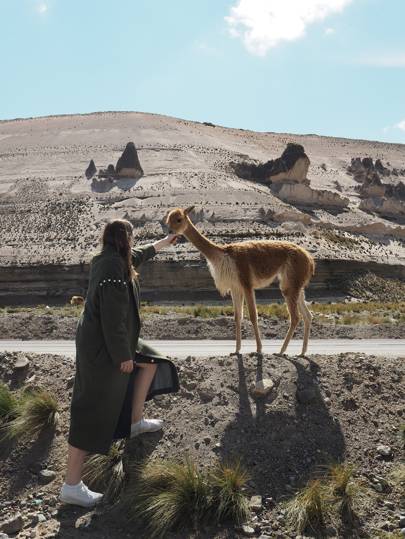“When David Attenborough issued his rallying cry about the devastating effect of plastic in the oceans in Blue Planet II, that documentary really changed the nation,” says Amy Powney, speaking over the phone from her east London studio. “BBC Earth was behind that documentary, so when we were approached by them in September last year, I was inspired by their broadcasting power. They are able to talk to a vast number of people and their subject matter is always about trying to make a change, which is something I’ve been trying to do on a smaller scale with Mother of Pearl. What we want to do at LFW is use the week to start a conversation, talk about the issues, but also offer solutions.”
Part one comprises a talks series. Working with the BFC, Powney and BBC Earth have curated a series of talks on Saturday 16 February bringing together voices for change from the fashion industry, such as the designer Christopher Raeburn and Dr Orr Yarkoni, co-founder of Colorfix, the textile dye company which uses engineered organisms to produce pigments, with experts from BBC Earth, including Liz White, the national history unit producer of Planet Earth II and the upcoming Frozen Planet II, and Julia Kenyon, the global brand director for BBC Earth. Up for discussion: Circularity – and what that means now; how revolutionary technologies are changing the fashion industry; and what brands can do to be more sustainable.
“We don’t want it to be all doom and gloom – this is about positivity, and we want to offer solutions,” says Powney, one of the chirpiest, best-informed voices in the fashion sustainability space. “Nature’s ability to rejuvenate is something to be celebrated. But it goes without saying that we need to be modern-thinking, and we need to make some serious changes to the fashion industry.”
“We don’t want it to be all doom and gloom – this is about positivity, and we want to offer solutions,” says Powney, one of the chirpiest, best-informed voices in the fashion sustainability space. “Nature’s ability to rejuvenate is something to be celebrated. But it goes without saying that we need to be modern-thinking, and we need to make some serious changes to the fashion industry.”

Part two: in June, Mother of Pearl will release a capsule eveningwear collection of nine pieces exclusively with Net-A-Porter.com, designed in conjunction with BBC Earth, which builds on the success of its ground-breaking No Frills line of truly sustainable clothing. “We’re using 100 per cent certified peace silk, working with Cocccon, a vertically integrated company that has managed to create a very simple supply chain, from certification to dye to print, all under one roof,” she says, excitedly. “It’s going to be fancy – all those beautiful silk dresses you want to wear to summer parties in the sunshine.”
And if you can’t wait that long, on Monday, Mother of Pearl unveils its spring/summer 2019 collection (some of which is immediately available for purchase) in a chapel alongside an installation of giant (recycled) plastic balls intended to draw attention to the microplastics issue. “But don’t worry – every element of the show has been hired so there’s no waste,” she reassures me.
And if you can’t wait that long, on Monday, Mother of Pearl unveils its spring/summer 2019 collection (some of which is immediately available for purchase) in a chapel alongside an installation of giant (recycled) plastic balls intended to draw attention to the microplastics issue. “But don’t worry – every element of the show has been hired so there’s no waste,” she reassures me.
If anyone can convince you to ditch your fast fashion habit, it’s Powney – though even she occasionally has her slip-ups. “I’ve been so busy over the last few weeks I’ve practically eaten takeaway every night!” she laughs. “My new year’s resolution was to write down what meals I’m going to cook every night for the week ahead, and then order them from Riverford, an amazing company of organic farms that delivers convenient, easy, packaging-free food. My recycling bin is basically empty as a result – which is good, because we know lots of things we put in our recycling bags never make it to a recycling plant.”
She pauses for thought. “Oh, and I also changed my toilet paper to a company called Who Gives A Crap! It’s a subscription service of 100 per cent recycled or bamboo toilet paper, with minimal packaging, delivered to your house, and 50 per cent of its profits are donated to help build toilets in parts of the world where people don’t have them. We get it delivered every quarter and store it in our loft.”
She pauses for thought. “Oh, and I also changed my toilet paper to a company called Who Gives A Crap! It’s a subscription service of 100 per cent recycled or bamboo toilet paper, with minimal packaging, delivered to your house, and 50 per cent of its profits are donated to help build toilets in parts of the world where people don’t have them. We get it delivered every quarter and store it in our loft.”

No comments:
Post a Comment